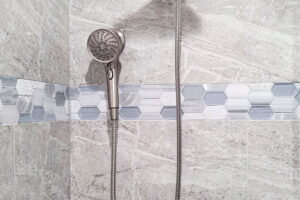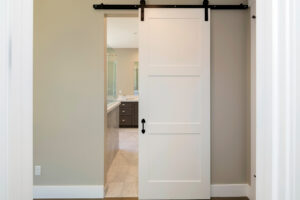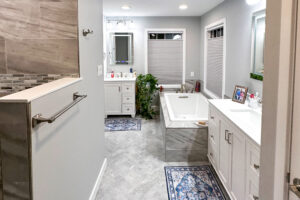Door replacement for your Philly rowhome might not be the first thing that comes to mind when you think of a remodel. While an important part of your home, doors can sometimes go unnoticed for a long time as people come and go.
But doors aren’t just a crucial part of your rowhome’s appearance – they’re a big part of what makes your home unique and enjoyable. They control your traffic flow and can, when set on the exterior, show everyone how your home is a unique part of the community.
Whether you’re replacing a worn-out entryway or looking to revamp your interior spaces, choosing the right door can significantly impact your home’s functionality, appeal, and energy efficiency.
In this guide, we’ll explore a few door types, weighing their pros and cons with a particular focus on how they fit into the unique demands of Philly rowhomes. We’ll also discuss common door issues that signal an underlying issue.
1. Solid Doors
These are a classic choice. Solid doors offer:
- Pros: Excellent soundproofing, security, and insulation. They are available in different materials (wood, fiberglass, steel) and fit a wide variety of budgets and styles.
- Cons: Can feel bulky in smaller spaces, especially if swinging inward. Steel doors can be susceptible to dents, while wood may require more maintenance.
Ideal For: Entryways, bedrooms, or any room where sound insulation or privacy is a priority.
2. French Doors
French doors consist of two hinged doors that meet in the middle. These doors are often fitted with luxurious glass panes.
- Pros: Let in abundant sunlight, create a sense of spaciousness, and ideal for opening up a room to a patio or balcony.
- Cons: A high ticket item that offers less privacy and soundproofing than solid doors. Also comes in a double-door configuration that requires clearance on both sides. Can be a problem for rowhomes because they require more space than other doors.
Ideal For: Living rooms, dining rooms, or anywhere you want to maximize light and create a connection between spaces.
3. Sliding Doors
These trendy doors slide on a track mounted above and below the doorway. Barn doors are a subtype that provide a more rustic feel.
- Pros: Save space by not swinging open, add a unique design element, and can be customized in various materials and finishes.
- Cons: Offer less privacy and soundproofing. The sliding track requires wall space beside the door opening. Can be a challenge to keep clean as dust, dirt, and other elements can wedge in the door’s track.
Ideal For: Pantries, closets, or as a space-saving solution for bedrooms and bathrooms.
4. Pocket Doors
Practical and discreet, pocket doors disappear into a wall cavity when opened.
- Pros: Maximize floor space, ideal for tight hallways or small rooms. Can be used for a seamless transition between rooms.
- Cons: Installation is a little more complex. Offers less soundproofing than solid doors. Can be a difficult to clean the track.
Ideal For: Bathrooms, laundry rooms, or anywhere space is at a premium.
5. Louvered Doors
Featuring angled slats, louvered doors allow for airflow and ventilation.
- Pros: Ideal for closets or laundry rooms where air circulation is needed. Available in various styles, from traditional to modern.
- Cons: Less privacy and security than solid doors. The slats can accumulate dust and require regular cleaning.
Ideal For: Closets, laundry rooms, or anywhere ventilation is desired.
6. Folding Doors
Similar to accordion doors, folding doors consist of multiple panels that fold together when opened.
- Pros: Can cover wide openings, create flexible spaces, and offer a unique aesthetic.
- Cons: Less soundproofing and privacy than solid doors. Can be more expensive and complex to install.
Ideal For: Closets, laundry rooms, or to divide larger rooms into separate spaces.
7. Dutch Doors
Charming and functional, Dutch doors are split horizontally, allowing the top and bottom halves to open independently.
- Pros: Let in light and air while keeping pets or children contained. Offer a unique and traditional look.
- Cons: Less privacy and soundproofing than solid doors. A unique look that’s unsuitable for some styles of home.
Ideal For: Kitchens, mudrooms, or anywhere you want to maintain a connection while still having a barrier. Sheds and external doors to backyard areas can also be ideal.
Common Door Issues and When to Call a Pro
- Sticking or jamming: Could be caused by humidity, loose hinges, or a misaligned frame.
- Drafts: May indicate weatherstripping issues or gaps around the door frame. This is an insulation issue that can lead to higher energy bills and decreased in-home temperatures in winter.
- Difficulty locking or unlocking: Could be due to a worn-out lock mechanism or a misaligned latch.
- Cracks or holes: Compromised insulation and security.
If you’re unsure how to address any of these problems, it’s best to consult a professional. Incorrect repairs can exacerbate the issue or even damage your door.
You Have Options for Door Replacement
Different door types offer different possibilities. Pocket or sliding doors can open up space for more furniture or just optimize traffic flow, while solid doors are dependable, durable, and easy to maintain.
If a door is giving you trouble or it’s time for a replacement, we can help you with any questions or concerns you might have. We offer a free, no-obligation estimate to assess your specific needs. No matter your rowhome door replacement choice, we’ll tailor your order to your home’s unique architectural style.



